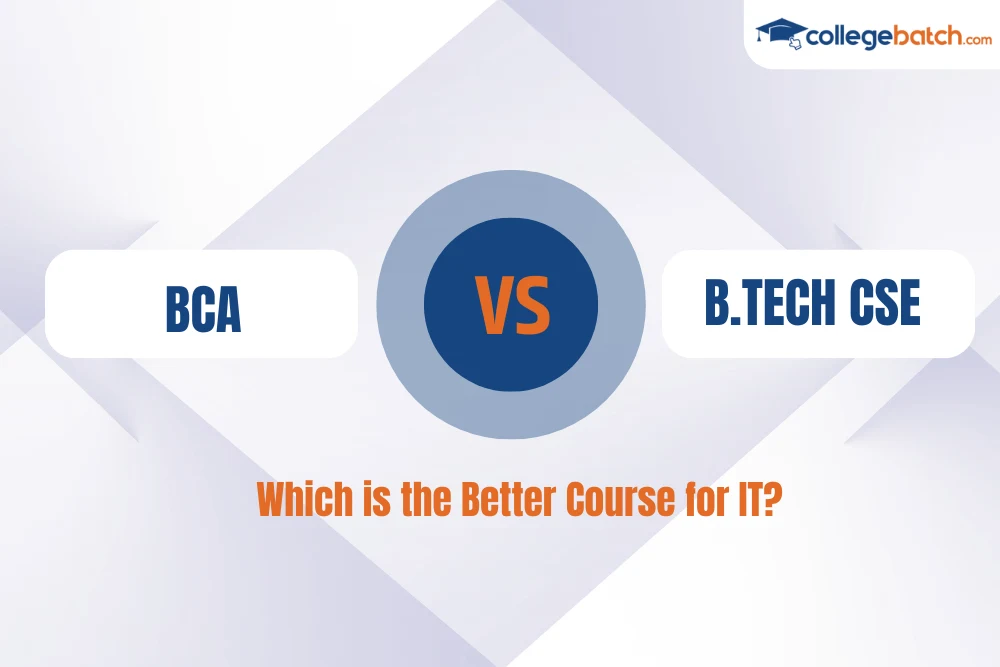BCA vs B.Tech CSE: Which is the Better Course for IT
by ago 27 views0

The two most common undergraduate course options to pursue in the field of Information Technology (IT) are Bachelor of Computer Applications (BCA) & the Bachelor of Technology (B.Tech) in Computer Science and Engineering (CSE). In order to determine which one is a better course for IT, students should be aware of the important difference between BCA and B.Tech in CSE and then choose as per their preference.
Understanding the distinction guides students to choose the path between B.Tech or BCA- which is better for them and aligns more with their career aspirations. This blog explores all the essential differences between BCA and B.Tech, including the contrast in what each of the programs focuses on, their salary, eligibility, fees, and other essential factors.
Contents
Major Differences – BCA vs B.Tech (CSE)
While both the programs can lead students to establishing a successful future in the IT sector, they differ significantly in their approach and outcomes. The below-outlined table highlights the major difference between BCA and B.Tech in CSE courses:
| Particulars | BCA | B.Tech in CSE |
| Focus | It focuses on the practical application of Computer Concepts, Software Development, Web Technologies, and Business Applications. | It provides a comprehensive and detailed understanding of both Software and Hardware, with advanced topics in Engineering and core Computer Science discipline. |
| Duration | 3 years | 4 years |
| Eligibility | Generally, students who have passed 12th Standard in any stream from a recognised Board can apply. Some educational Institutions may prefer students who have studied Mathematics or Computer Science at 10+2 level. | Students who have completed 12th Class with Physics, Chemistry, and Mathematics (PCM) with the minimum qualifying marks are eligible. Admission is typically done on the basis of merit marks in the competitive entrance exams like JEE Main. |
| Course Structure | Application-oriented, with programming languages like C, C++, Java, Operating Systems, Computer Networks, and Web Development. | Theoretical and in-depth study of Advanced Mathematics, Data Structures & Algorithms, Operating Systems, Computer Organization and Architecture. |
| Average Annual Fees | Rs. 50,000/- to Rs. 2,00,000/- | Rs. 80,000/- to Rs. 6,00,000/- |
| Job Roles | Software Developer, Web Developer, IT Support Specialist, Database Administrator, etc. | Higher-level, core Engineering roles such as Software Engineer, Data Scientist, AI/ML Engineer, Cyber Security Analyst, and so on. |
| Average Annual Salary | 2.5 LPA to 5 LPA | 3 LPA to 6.5 LPA |
Also Check:BCA Salary in India
BCA and B.Tech CSE: Which is Better?
Ultimately, the major deciding factor after analysing BCA and B.Tech differences should be whether the course aligns with the students’ professional and career goals, budget, educational Institution choice, and other important aspects.
It can be further classified as:
1. Career Goals
One of the major differences between BCA and B.Tech (CSE) lies in the career prospective of the students. B.Tech (CSE) can be preferred by students interested in core technical roles and fields like AI, Cyber Security, etc., requiring strong Mathematics and theoretical concepts of Engineering. In contrast, BCA is a better fit for students who prefer practical software development and application-level skills for roles like Web Development, IT support, and others.
2. Affordability and Course Duration
One of the most significant BCA vs B.Tech differences is the program fee and duration. The duration of the BCA course is of 3 years and is generally less expensive as compared to B.Tech (CSE), making it a quicker and more affordable way into the IT industry.
3. Educational Institution and Placement Perception
The reputation of the Colleges / Institutions / Universities offering the program plays an important role in facilitating the students with placements and network opportunities. Top educational Institutions for both BCA and B.Tech (CSE) provide a strong foundation of the program to the students and invite reputed IT industries and firms for conducting placement drives. However, a notable difference between BCA and B.Tech CSE is that the starting packages for BCA graduates are often lower than those of B.Tech (CSE), but can increase with experience and after completing a Master’s degree like MCA.
4. Background
B.Tech (CSE) typically requires students to be qualified with a strong Science background (PCM) in their 12th Grade along with clearing competitive entrance exams like JEE. It is more feasible to take admission in the BCA program in this context as various educational Institutions often accept students with any academic stream at the 10+2 level. This crucial difference between BCA and B.Tech in regards with eligibility conditions makes BCA a more preferable option for non-Science students who want to establish their career in the IT sector.
5. Higher Education
For BCA graduates, pursuing a Master of Computer Applications (MCA) for in-depth specialisation can help them compete with B.Tech graduates for top technical job roles. Moreover, B.Tech graduates can pursue further studies like M.Tech to enhance their knowledge and skills in Computer Science Engineering and open gates to high job roles in the IT sector.
Conclusion
Choosing the ideal course between a Bachelor of Computer Applications (BCA) and a Bachelor of Technology in Computer Science and Engineering (B.Tech CSE) depends on various factors like personal interests, academic background, and future aspirations of the students. BCA can be ideal for students preferring a faster and affordable path in the IT industry with practical application of computer concepts.
On the other hand, a B.Tech CSE can be more suitable for students who are interested in in-depth Engineering principles of Computing, including both hardware & software, and aiming for core technical roles in the IT sector. Therefore, by understanding the major difference between BCA and B.Tech in CSE, students can choose the path that best aligns with their interests and supports professional growth.
